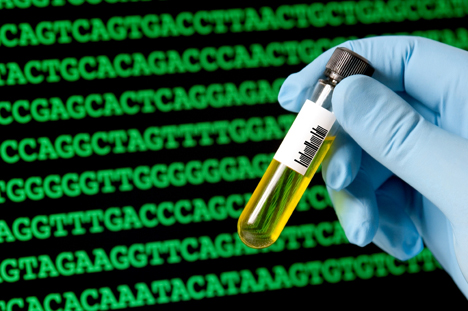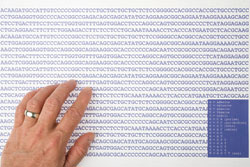
Ask Sara Katsanis why she cares about safeguarding DNA samples and test results, and she won't mention privacy, identity theft, or denials of health care coverage. Instead, she'll tell you about a woman who gave up adopting a Guatemalan child after discovering the child and the individuals claiming parentage weren't related. She'll even tell you other couples don't care and adopt anyway.
At first glance, confronting adoption fraud - the practice where adults put unrelated children up for adoption - doesn't seem directly connected to genetics research. But for Katsanis, a genetics expert who sees the potential for abuse of DNA, it's an easy fit.
Now a research associate in the Institute for Genome Sciences & Policy (IGSP), Katsanis knew after completing her graduate degree that she wasn't destined to work at the bench, investigating the minutiae of specific genes in some tucked-away lab. She was far more interested in the usefulness of DNA and protecting it from misuse.
"When it comes to genetics and genetic testing, it's important to look broadly at the policy implications of applying science in a way that gathers and stores DNA information," she said. "My interest is determining how to minimize the impact on the public's civil liberties while still using the genetic information in a way that can protect vulnerable groups."
Her path to genetics policy work, however, was a bit of a winding road. In the mid-1990s, she launched her career as a DNA analyst for a forensics lab. She later moved into biotechnology to work with the mouse genotype before transitioning to the DNA Diagnostic Lab at Johns Hopkins University. At Hopkins, she conducted cystic fibrosis and other prenatal genetic tests and developed a new diagnosis-based fetal sequencing technique.
By that point, Katsanis was keenly aware that the genetics industry had no broad policy for handling DNA tests - each agency that uses the tests follows its own guidelines. Taking a role as a collaborator on genetics oversight with Hopkins' Genetics & Public Policy Center gave her a platform to address her concerns.
Today, she uses her expertise to shape public policy that hits the delicate balance between meeting society's needs and protecting individual citizens' rights with specific focuses on adoption fraud, forensics, and pharmacogenetics. It isn't an easy task.
In combating adoption fraud, Katsanis recommends altering DNA tests used for crime scene analysis so they pinpoint genetic markers more suited for determining kinship, such as phenotype and ancestry single nucleotide polymorphisms (a DNA sequence variation on one nucleotide). Using different markers will create a powerful tool to protect powerless children, she said, but the genetics field must first research the impact of the change.
"We need to understand the ramifications on the population as a whole of using these markers in this way," she said. "And, after analysis, what do we do with the samples? Who keeps them? Do we dispose of them? How do we protect people? We have a responsibility to make sure we're not raising ethical issues."
Fighting Sex Trafficking
Katsanis currently collaborates with the international company DNA Pro-kids to supply DNA kits to adoption agencies in Guatemala. She also works with the interdisciplinary UNC-based Carolina Women's Center to combat sex trafficking globally.
According to Donna Bickford, the Center's director, it is Katsanis' unique blend of hard science and public policy experience that makes her invaluable to the center.

"[Katsanis] is the only member of the Research on [Sex] Trafficking work group at the center who is in the hard sciences," Bickford said. "She brings a different appreciation to our work around human trafficking. She knows how to use scientific evidence to identify potential or current victims."
A database with DNA from women in the sex trade could help law enforcement if a woman is a victim of a violent crime, and the Dallas police department launched one such database in July. But, Katsanis said, law enforcement officials could use the database beyond its intended purpose if a prostitute were suspected in a crime, placing many innocent women at risk for discrimination.
Katsanis sees similar pitfalls with databases of DNA from criminals. Police success in using this information to solve cold cases has prompted public officials to suggest expanding the collections to include samples from individuals who were only arrested or convicted of misdemeanors. The implications are far reaching.
"At first glance, expanding databases is a great idea, but if we devote more resources to putting more samples into the system, we have less ability to process actual case samples," Katsanis said. "Familial searching could also be a problem. For instance, a woman is convicted of assault, and her DNA goes in the database. If her son throws a rock through a window, and the police pull DNA from the rock, they could identify the son through the mother's DNA without her consent."
Katsanis' work will impact the criminal justice system operates, as well as future uses for identifying information, said Lauren Dame, associate director of the IGSP Center for Genome Ethics, Law & Policy.
"In criminal cases, if DNA evidence is offered in a trial and something in the way the test was conducted raises questions about accuracy, then confidence in the legal system breaks down," she said. "Privacy regarding DNA in databases, though, is a complicated policy issue. Without fail, pressure always builds to expand the functions of these collections beyond their initial intended purpose."
A clinical application for Katsanis' work exists in pharmacogenetics. Her interest lies in the amount of genetic evidence needed to change warning labels about drug side effects common to racial or ethnic groups. Currently, medications can warn against use by an entire ethnic group when genetic tests indicate only a sub-group is at risk. The lack of specificity can affect prescribing patterns and deny some individuals the drug's benefit.
But science alone can't change the public policy approach to genetics, Katsanis said.
"Genetics policy takes scientists, lawyers and communicators pulling together to really understand the issues," she said. "If we do it in silos, it doesn't work. That's why I came to Duke."